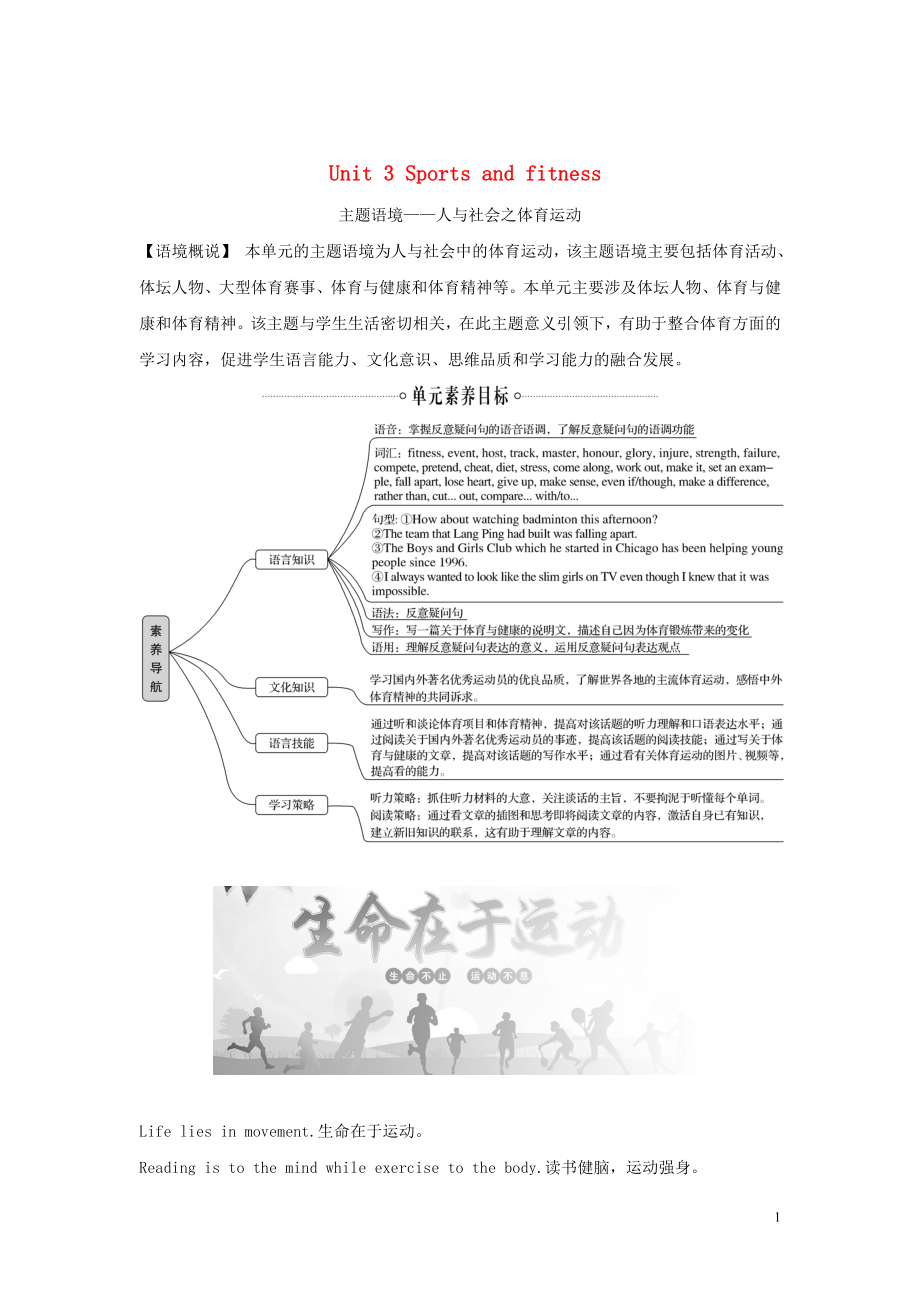《2019-2020學(xué)年新教材高中英語 Unit 3 Sports and fitness Section Ⅰ Listening and Speaking學(xué)案 新人教版必修第一冊》由會(huì)員分享���,可在線閱讀�,更多相關(guān)《2019-2020學(xué)年新教材高中英語 Unit 3 Sports and fitness Section Ⅰ Listening and Speaking學(xué)案 新人教版必修第一冊(8頁珍藏版)》請?jiān)谘b配圖網(wǎng)上搜索���。
1�����、 Unit 3 Sports and fitness
主題語境——人與社會(huì)之體育運(yùn)動(dòng)
【語境概說】 本單元的主題語境為人與社會(huì)中的體育運(yùn)動(dòng)��,該主題語境主要包括體育活動(dòng)�、體壇人物、大型體育賽事����、體育與健康和體育精神等。本單元主要涉及體壇人物�����、體育與健康和體育精神�����。該主題與學(xué)生生活密切相關(guān)��,在此主題意義引領(lǐng)下����,有助于整合體育方面的學(xué)習(xí)內(nèi)容�����,促進(jìn)學(xué)生語言能力、文化意識��、思維品質(zhì)和學(xué)習(xí)能力的融合發(fā)展��。
Life lies in movement.生命在于運(yùn)動(dòng)�����。
Reading is to the mind while exercise to the body.讀書健腦�,運(yùn)動(dòng)
2、強(qiáng)身��。
Sports not only can change a person’s physical fitness�,more can change a person’s character.
體育運(yùn)動(dòng)不僅能改變?nèi)说捏w質(zhì),更能改變?nèi)说钠犯瘛?
Section Ⅰ Listening and Speaking
1.Translate the following words and phrases.
①boxing n. 拳擊 ?、趕ki v. 滑雪
③badminton n. 羽毛球 ④marathon n. 馬拉松
⑤fitness n.
3、 健康 ⑥poster n. 海報(bào)
⑦track n. 跑道�����;足跡 ⑧host v. 主辦
⑨sweat n. 汗水 ⑩an e-sports event 電子競技運(yùn)動(dòng)
?instead of 代替 ?come along 跟隨�����;到達(dá)
?work out 鍛煉�����;解決 ?make it 獲得成功
2.Brainstorming:What kind of sports do you like to play?
soccer/football,basketball���,badminton���,swimming,running�,boxing,marathon
4����、etc.
3.Look at the pictures on Page 36 and tell your classmates what they are doing?
They are playing soccer/badminton/boxing/running a marathon.
4.Finish Ex.1 on Page 36.
5.Try to translate the sentence in various ways.
觀看足球比賽好嗎�����?
①Would you like to watch the soccer match?
②How
5��、about watching the soccer match?
③Why not/don’t you watch the soccer match?
④Do you want to watch the soccer match?
⑤Would you please watch the soccer match?
⑥Shall we watch the soccer match?
語言知識積累
表示建議的常用表達(dá)
1.Would you like to do...?
2.How about doing...?
3.Why
6��、 not do/don’t you do...?
4.Do you want to do...?
5.Would you please do...?
6.Shall we do...?
文化知識習(xí)得
1.為什么足球在美國叫soccer?
soccer這個(gè)詞并不是美國人自己發(fā)明的��,而是20世紀(jì)從英國傳到美國去的����。而在當(dāng)時(shí)�,美國人也有了自己的football運(yùn)動(dòng)(其實(shí)就是現(xiàn)代美國的橄欖球)�,于是為了區(qū)別,美國人將足球稱為soccer�。
2.馬拉松比賽有哪些?
馬拉松(Marathon)長跑是國際上非常普及的長跑比賽項(xiàng)目�,全程距離26英里385碼,折合為42.195公里�。分全程馬拉松
7、(Full Marathon)��、半程馬拉松(Half Marathon)和四分之一馬拉松(Quarter Marathon)三種��。
1.Finish Ex.2 & Ex.3 on Page 36.
2.Finish Ex.4 on Page 37.
學(xué)習(xí)策略形成
1.學(xué)會(huì)用不同句式表達(dá)建議�。
2.學(xué)會(huì)用發(fā)音強(qiáng)弱突出表達(dá)的內(nèi)容。
1.Speaking—Finish Ex.5 on Page 37 by following the example.
A:Did you hear that there’s the Youth Ski Race in Zhangjiakou in
8����、 December?Would you like to come along?
B:Really? I’d love to!
A:Why don’t you join us this Sunday morning?
B:Oh��,sorry.I can’t./ Of course�����,I’d like to.
2.Pronunciation
(1)The intonation of tag questions is rising.
①You’re going for a walk with me,↗ aren’t you?
你是要和我一起去散步嗎�?
②She is coming tom
9、orrow���,↗ isn’t she����?她是不是明天來����?
③You weren’t here on Monday,↗ were you����?周一你沒在這里,是吧��?
④Mary will marry next week�����,↗ won’t she����?瑪麗是下個(gè)月要結(jié)婚嗎?
(2)The intonation of tag questions is falling.
①It’s hot today�����,↘ isn’t it��?今天好熱�,不是嗎?
②The film is so boring�,↘isn’t it?這部電影很無聊�,不是嗎?
③You don’t like the clothes����,↘
10、do you�?你不喜歡這件衣服,是嗎����?
④You will go shopping,↘ won’t you����?你要去購物�,不是嗎���?
反意疑問句的語調(diào)
1.升調(diào):反意疑問句的疑問形式部分通常用升調(diào)��,表示說話者并不十分確定陳述句部分所表達(dá)的信息����,或者表示說話者并不強(qiáng)迫對方同意自己的觀點(diǎn)�,用反意疑問句只是為了簡單的詢問。
2.降調(diào):在反意疑問句中��,如果說話者特別肯定對方可能給予的答案�����,或者是特意向?qū)Ψ绞疽庹f話者與聽者的意見是一致的�,這時(shí)疑問部分用降調(diào)。
1.work out鍛煉�;計(jì)算出;解決�����; 弄清�;制定出
Come and work out at a gym!(教材P37)來健身房
11��、鍛煉吧����!
[合作探究] 體會(huì)work out的用法和意義
① While the boys are golfing,I work out in the gym.
小伙子們打高爾夫球的時(shí)候����,我在健身房鍛煉。
②They will meet later today to work out a plan.
他們定于今天晚些時(shí)候進(jìn)行會(huì)談�����,制定一個(gè)方案�。
③It took me some time to work out what was causing this.
我花了一些時(shí)間才弄清此事的起因。
[自主發(fā)現(xiàn)]
④意為“鍛煉”時(shí)�����,work out 為不及物(及物/不及物)動(dòng)詞短語�����;
12、
⑤意為“計(jì)算出����;解決; 制定出”時(shí)為及物(及物/不及物)動(dòng)詞短語�。
[詞塊積累]
work out in the gym在健身房鍛煉
work out a plan 制定一項(xiàng)計(jì)劃
work out a problem 解出一個(gè)問題
[鞏固內(nèi)化] 補(bǔ)全句子
①I believe that you can work out this problem by yourself.
我相信你自己能做出這道題的。
②I often work out to keep fit.
我經(jīng)常鍛煉身體以保持健康��。
2.make it 獲得成功��;準(zhǔn)時(shí)到達(dá)����;及時(shí)趕上
You c
13、an make it.(教材P37)你能獲得成功�。
[合作探究] 體會(huì)make it的用法和意義
①We just made it to the sports meeting.我們剛剛及時(shí)趕上了運(yùn)動(dòng)會(huì)。
②I hope you will make it someday�����;I’m sure you will become a successful football player.我希望你有一天能成功�����。我相信你能成為一名出色的足球運(yùn)動(dòng)員��。
[思考] 借助詞典,想一想慣用詞it的習(xí)語還有哪些���?
①forget it 不用提;不用謝
②I got it.我明白了����。
③take i
14、t easy別著急
④believe it or not信不信由你
⑤take it for granted認(rèn)為……理所當(dāng)然
[鞏固內(nèi)化] 同義句轉(zhuǎn)換
①Believe in yourself.You can be successful!
→Believe in yourself.You can make it!
②I’m sorry�,I won’t be able to get to the party in time.
→I’m sorry,I won’t be able to make it to the party.
Ⅰ.Listening
(
15���、Ⅰ)Listen to the first dialogue just once and choose the best answer.
Who won Sally in the match?
A.Mark. B.Mark’s brother. C.Her brother.
答案 C
聽力原文:
W:Who took you to the tennis match yesterday afternoon?
M:My friend Mark took me there.
W:Who beat Sally in the match?
M:Her brother beat her
16��、.
(Ⅱ)Listen to the second dialogue twice and choose the best answer.
1.What is Tom going to play?
A.Basketball. B.Table tennis.
C.Tennis.
2.Which class will Tom have a match with tomorrow?
A.Class Four. B.Class Five.
C.Class Six.
答案 1.C 2.A
聽力原文:
M:Hi! Jane.Where are you going?
W:
17�����、Hi�,Tom.I am going to the playground.
M:I am going to play tennis.We will have a match with Class Four tomorrow.Do you like playing tennis?
W:Oh��,yes.I like it very much.
M:Do you want to join us?
W:Yes��,but I have to go back to get my shoes and rackets.
M:All right.See you on the playground.
W:
18�、See you.
Ⅱ.Listening and speaking
(Ⅰ)Listening—Listen to the third dialogue twice and fill in the blanks.
W:Jack���,what kind of exercise do you like to do?
M:Well,I love to do push-ups and I ①go cycling every day.
W:What do you like about them?
M:They’re free of charge anyway.Well�����,it makes me f
19��、eel ②stronger��,but the important thing is that it makes me ③feel good.
W:What else do you do?
M:Swimming�����,jogging��,④playing football.
W:Wow����!That sounds great.⑤How often do you go jogging?
M:I try to do at least a little every day.The key to ⑥doing exercise is to do it regularly.
W:What is ⑦the best exercise for my health?
M:I think it’s ⑧impossible to name one exercise that’s good for everyone.
(Ⅱ)Speaking—Make a dialogue with your partner to talk about your favourite sports.
The answer is open.
8
 2019-2020學(xué)年新教材高中英語 Unit 3 Sports and fitness Section Ⅰ Listening and Speaking學(xué)案 新人教版必修第一冊
2019-2020學(xué)年新教材高中英語 Unit 3 Sports and fitness Section Ⅰ Listening and Speaking學(xué)案 新人教版必修第一冊

